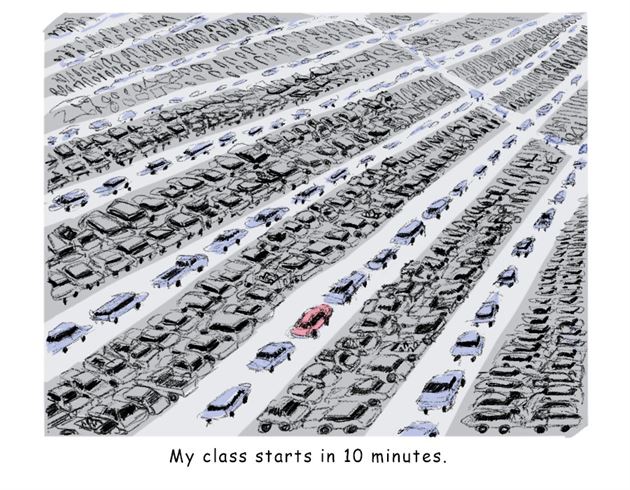Complaining about parking at Montclair State University is a time-honored tradition by now, and with good reason. Every year around mid-August, thousands of students hop online to purchase a commuter parking pass, dread rising in their guts as they envision the inevitable. In a couple of weeks, they will be one car amongst the glut of vehicles filled with anxious, impatient drivers silently praying to an entity of their choosing for a place to park.
Car Parc Diem, the biggest and most popular commuter parking lot, has eight levels of parking available to the many students who drive to Montclair State. But with 2021 seeing the enrollment of the largest incoming class in the university’s history, the already unreasonably bad parking situation has gotten even worse. Despite a multilevel parking deck and multiple commuter lots located around campus, it’s impossible to pass a day on campus without overhearing multiple complaints about how difficult it is to find a spot.
A full-year commuter parking pass costs commuters $277.23 this year with tax. It’s $277.23 for the possibility of having to park what feels like miles away from your first class. For $277.23, you too will have to show up at least two hours before your 9:45 a.m. class, depending on how far away you live.
For years, administrators have claimed they are working to address the myriad of problems and complaints surrounding Montclair State’s parking options. But the administration’s insistence on as many in-person classes as possible means more commuters, more people forced to pay exorbitant amounts for parking passes that guarantee nothing. Forcing students to spend money they may or may not have due to the hardships of the coronavirus (COVID-19) pandemic while causing such unnecessary stress is unethical.
But why work to address a problem when it brings in a profit? There’s no point in pretending the university’s only motivation to return to a “normal” learning environment was for the comfort and overall happiness of students. Parking passes are a separate expense from tuition and necessary for anyone who has a car, and no commuters means less income.
Clearly, commuter parking passes were and are oversold beyond the number of available spaces. This is likely because, in addition to more people present on campus, commuters and residents still have to share designated parking lots. Even more baffling is the fact that many of the smaller lots where commuters can park are located near the residence halls, while residents must duke it out with visitors in the Red Hawk Deck to find parking or search for off-campus spots.
Leaving campus on time is just as excruciating as arriving. Clusters of pedestrians cross the busy streets, sometimes recklessly and with no interruptions for several minutes. With the usual crossing guards having mysteriously vanished, replaced by the occasional presence of a single university police officer, traffic is often backed up by Yogi Berra Drive multiple times a day.
Logistically, this is a complicated problem, and one of the simplest solutions would be to put a lower cap on the number of commuter parking permits sold. Another option is to designate certain levels in the Red Hawk Deck for visitor parking and give residents the majority. Ideally, space could be found and allocated for another multilevel commuter lot.
What cannot be allowed is a continuation of the current approach, which seems to be hoping everything will right itself as the semester goes on. The university anticipated a large incoming class; surely it could have worked to prevent an existing problem from becoming a daily calamity, and yet that didn’t happen. It’s certainly hard to feel welcomed back to campus when even the most basic amenity is overpriced and largely unavailable.



